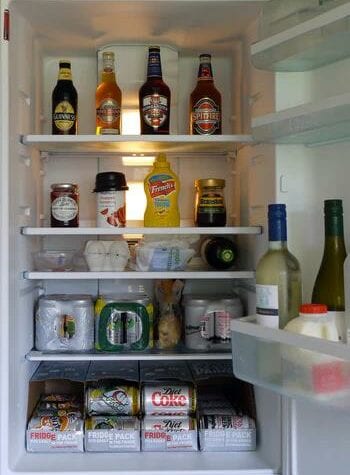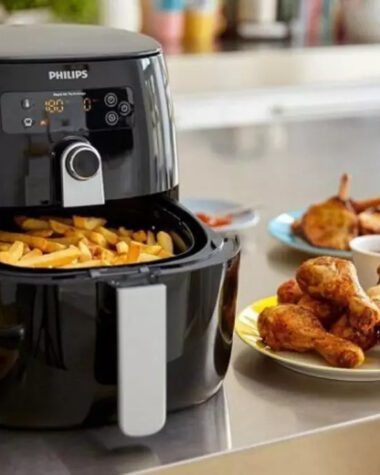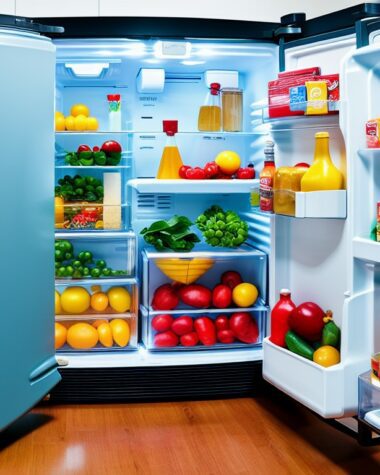Refrigerators are essential equipment in almost every household, but they are only built to last for a while. Once they break, they’re a massive waste of space. Furthermore, because their weight makes them heavy and difficult to move around, people often keep them in place, eventually becoming junk appliances.
This May Also Interest You: Refrigerator Lifespan: How Long Does It Last Before It Needs Replacing
Fortunately, you won’t have to put a strain on yourself transporting your refrigerator to a recycling site. Ease your worries because we here at DaDongNY will show you how to safely dispose of your old refrigerator. We will also give you tips on how to dispose of your old equipment without harming the environment.
It’s Time To Replace Your Refrigerator, My Friend
If your refrigerator is no longer keeping your food cool enough to avoid food spoilage, it might be the perfect time to replace it with a new one.
This May Also Interest You: Why Should The Refrigerator And Freezer Be This Cold (A Guide)
But, before you throw away your kitchen appliance, look for a professional electrician to determine what exactly the problem is and whether the refrigerator can be repaired.
You may also try conducting a simple assessment yourself by following the steps listed below:
- High Temperature
The refrigerator you have at home comes with a control panel. Check the controls and make sure that the setting has been set at a lower temperature, providing effective cooling.
- Compressor
Your refrigerator also has a compressor, which is located at the back. If you want to check whether the compressor is working properly, listen to the sound of the engine as it operates, running alongside the temperature.
Disposing of Your Refrigerator Away In The Dumpster
When you’ve determined that your refrigerator is no longer performing as effectively as it should, it’s time to eliminate it. However, putting out your appliance after it is no longer in use is more complex than putting out the garbage.
Refrigerators are massive appliances that are made with electric and chemical mechanisms. As a result, numerous environmental risks are involved with disposing of these kinds of items. This renders appropriate refrigerator disposal even more important.
Luckily, plenty of options exist to properly and effectively dispose of your refrigerator.
How To Get Rid Of A Refrigerator
- Bulk Trash Collection Days
Your city’s waste management provider sometimes offers bulk garbage pick-up days. The company has placed out certain days to collect big garbage, such as old refrigerators.
Visit the website or contact your local waste management provider for information on when this service will be available. After that, you will have to move your refrigerator a couple of days before pick-up day.
Suppose your municipality does not provide bulk garbage collection days. In that case, you may simply schedule a pick-up with any waste collection company to have them get rid of the refrigerator for you.
Always remember to inform the company ahead of time that you plan on getting rid of your refrigerator to ensure they can make arrangements with regard to disposing of any chemical substances present within the appliance, such as freon or other refrigeration fluids.
- Schedule A Waste Collection Service Appointment
A refrigerator is usually too big to be hauled out of the curb by your regular garbage collection services. For this, you must contact multiple garbage pick-up providers to determine which services are most suitable for you.
Before you schedule an appointment with them, give them a thorough call. You must confirm with your garbage collection company what regulations you must observe.
The company usually requires you to detach all of your refrigerator’s doors, locks, and hinges and put them beyond your curb so they may collect them. Keep in mind to ask for the assistance of another person when lifting such heavy goods
- Sell Your Refrigerator To An Electric Company
Some companies provide a trade-in program through which they will buy back a piece of old equipment and exchange it for a new one. They may also provide cash or credit toward the following electric payment.
Reach your utility provider to check whether they participate in these programs and whether you could receive a rebate.
After that, your refrigerator must be hauled to the curb a couple of days before the planned pick-up date.
Luckily some electricity providers additionally offer pick-up services within your home, so check with them beforehand.
- Give Your Refrigerator To An Appliance Store
Some appliance stores are willing to buy your second-hand refrigerator. Inquire with the local stores near you for information on whether they have any regulations regarding old appliances.
Most sellers will acquire your old equipment and repair it so that it can be resold. They could additionally recycle and reuse and even sell the parts. This is a win-win scenario, given that you are getting rid of the garbage and the appliance seller is using it.
- Donate Your Refrigerator To A Recycling Facility
Recycling centers are becoming a norm. These facilities safely recycle every component of your appliances. That being said, look for a recycling location near you that is a participant in the Responsible Appliance Disposal program, then drop your refrigerator off.
Rest assured that they will thoroughly eliminate every trace of waste before recycling them. Most recycling centers can also pick up your old refrigerator from your home.
Still, there are a few considerations to take into account before donating:
- If the appliance was previously preserved, test it before donation. The refrigerator could not work as it did the day you last used it. This simple approach will save the facility from having to recycle a broken refrigerator.
- Your donation may be qualified for a tax deduction depending on the state in which you reside. If you need more clarification, it never hurts to ask.
- Keep in mind that older refrigerators use less energy than newer versions. While giving away your old refrigerator for resale is admirable, it can also lead to higher energy use and greenhouse gas emissions. Consider the advantages of recycling versus donating and choose the best solution.
- Sell Your Refrigerator To A Scrapyard
Scrap yards are comparable to recycling facilities because they will reuse all the metal within your refrigerator. That said, check with a nearby scrap yard to see if they accept second-hand refrigerators. After that, you must book transportation from your home to the scrapyard.
- Sell Your Refrigerator
If you’ve chosen to change to a new refrigerator, although your old one continues to be in good working order, consider reselling it. A lot of people choose to buy a used refrigerator.
As a result, you are able to allocate the proceeds from the sale of the old one to the purchase of the new one. You may take your refrigerator to a neighborhood market and negotiate a fair price, or you can sell it online.
There are numerous genuine internet marketplaces, which include Facebook and Craigslist, among others, where you can quickly sell your refrigerator.
- Give Your Refrigerator Away
If your refrigerator is still in good working order, giving it away or donating it is always more beneficial than discarding or throwing your appliance away. In order to do this, check through your local charity or donation center in order to determine if they’re in need of such items. Inform them about the refrigerator’s dimensions and condition.
A team of volunteers will pick it up from your home or arrange to transport it. As a result, your garbage could be beneficial to someone else. Make sure your refrigerator has been cleaned from the inside and out and is in working condition. Only donate it if there are a few problems since it will be worthless to everyone.
Tips To Take Into Account Before Disposing Of An Old Refrigerator
- Disconnect your refrigerator and put it aside for a few hours to defrost.
- Remove or tie the doors shut. Small children are frequently enticed to play with these products. Removing temptation aids in avoiding safety issues. If you can entirely remove the doors, that’s fantastic, but you can also tie them shut.
This May Also Interest You: How Tos: Remove A Refrigerator Door Like A Pro (Guide)
- Tape any loose goods, such as shelves and other compartments, to keep them from collapsing.
This May Also Interest You: Get A Clear Picture Of How To Remove And Clean Glass From A Refrigerator Shelf
- Get rid of raw meats, dairy products, and other similar items. Seriously, it’s shocking how often people throw out rotting food from their freezers or refrigerator.
- Take care to avoid moving the refrigerator by yourself. Take assistance from somebody else or leave it to professionals.
Importance Of Proper Refrigerator Disposal For The Sake Of The Environment
Refrigerators and other cooling equipment, such as air conditioners, utilize coolants, including CFCs and HFCs. Most refrigerators built before 1995 utilize CFCs as coolants, whereas newer models use HCFCs. Nevertheless, it all boils down to one specific thing.
They are both greenhouse gasses with adverse repercussions for the environment. These gasses have a few hundred to thousands of times the environmental impact of carbon dioxide emissions.
UV radiation breaks down these gasses within the stratosphere, and the chloride compound that results is very reactive with ozone. One atom is enough to shatter hundreds of thousands of ozone molecules simultaneously.
Several cooling appliances have started to use HFCs, which are considered to be ozone-friendly gasses, in the last decade. But they continue to be greenhouse gasses, so there is an urgent requirement to properly dispose of HFC-containing equipment such as refrigerators.
What Environmental Impacts Do The Different Refrigerator Parts Have
- Foam
A large number of refrigerators have structures made of foam, which is an excellent insulator. The foam features ozone-depleting compounds and greenhouse gasses, both dangerous to the environment.
However, other cooling systems, such as air conditioners, do not use foam, while all refrigerators built after 2005 use eco-friendly foam. As a result, they are environmentally friendly.
- Hazardous Components
As we’ve previously declared, most home appliances, such as refrigerators, contain a large number of chemical components. Mercury, refrigerant, and polychlorinated biphenyls (PCBs) were among refrigerators’ most common hazardous chemicals.
As an example of their effect on the environment, the refrigerant used in the refrigeration system has ozone-depleting characteristics.
Similarly, most refrigerators before 2005 contained extremely dangerous mercury, and most appliances before 1979 may contain PCB.
FAQs
- Can You Recycle A Refrigerator?
Yes, one can recycle their old refrigerator. Many cities have sufficient facilities in place to securely remove any hazardous substances from refrigerators just before other portions of them can be recycled.
- Is It Possible To Transfer A Refrigerator While Lying Down?
You certainly can. However, this will result in an unequal distribution of the refrigerant gas throughout the refrigerator. After positioning the refrigerator, allow it to rest for at least twenty-four hours before switching it on.
Bottomline
While it is time to dispose of your damaged or broken refrigerator, this does not imply that you should do it irresponsibly. Knowing that it contains a number of hazardous elements.
We hope our guide on ‘How to Safely Dispose of Your Old Refrigerator: Eco-Friendly Options’ was easy to comprehend and helped you understand the fundamentals of disposing of a refrigerator in an eco-friendly manner.
If you need help, contact your local waste management organization or recycling services such as LoadUp for assistance. To learn more about refrigerators and how this valuable piece of equipment chills the food and beverages inside, including your breast milk, check out the post here.
Articles You May Be Interested In
- A Cooler Choice: Whirlpool v.s GE Refrigerators (Full Guide)
- Refrigerator Check: LG v.s Samsung Refrigerators (Full Guide)
- Cool Tech Showdown: Frigidaire v.s Whirlpool Refrigerators (Full Guide)
- Fridge Favorites: Bosch v.s LG Refrigerators (Full Guide)
- Cooling Conundrum: Whirlpool v.s Samsung Refrigerators (Full Guide)
- Tale Of The Tape: Maytag v.s Whirlpool Refrigerators (Full Guide)
- Fridges in Focus: Thermador v.s Sub-Zero Refrigerators (Full Guide)
- Fridge Frenzy: Sub-Zero v.s Viking Refrigerators (Full Guide)
- The Big Chill: Whirlpool v.s KitchenAid Refrigerators (Full Guide)
- Refrigerator Bout: Whirlpool v.s LG Refrigerators (Full Guide)









